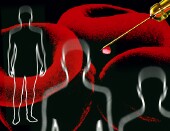- 10 Strategies to Overcome Insomnia
- Could Artificial Sweeteners Be Aging the Brain Faster?
- Techniques for Soothing Your Nervous System
- Does the Water in Your House Smell Funny? Here’s Why
- Can a Daily Dose of Apple Cider Vinegar Actually Aid Weight Loss?
- 6 Health Beverages That Can Actually Spike Your Blood Sugar
- Treatment Options for Social Anxiety Disorder
- Understanding the Connection Between Anxiety and Depression
- How Daily Prunes Can Influence Cholesterol and Inflammation
- When to Take B12 for Better Absorption and Energy
Experimental Drug for Blood Cancer Shows Promise


An experimental immune-boosting drug shows promise in fighting the blood cancer multiple myeloma, researchers report.
Preliminary testing of the drug daratumumab included 72 multiple myeloma patients who had previously received other types of treatment. Their disease had relapsed and no longer responded to treatment.
The patients received lower or higher doses of the drug for up to two years. Of the 42 patients who received a higher dose, 36 percent had at least partial remission, including two with complete remission, researchers report.
In this group, the disease was held in check for a median of 5.6 months. The researchers also found that two-thirds of patients who benefited from the drug had no advance of their cancer for at least 12 months.
Results of the combined phase 1 and 2 study strongly support testing the drug in a larger group of patients, the researchers said.
The most common side effects reported were fatigue, nasal congestion and fever. Less common but more serious side effects included pneumonia, low platelets, low white blood cell counts, anemia and excess blood sugar.
The study, published online Aug. 26 in the New England Journal of Medicine, was funded by biotechnology company Genmab and drug company Janssen.
The treatment of multiple myeloma has improved significantly in recent years, said senior study author Dr. Paul Richardson, director of clinical research at Dana-Farber Cancer Institute’s Jerome Lipper Multiple Myeloma Center in Boston. In particular, he singled out the introduction of so-called proteasome inhibitors and other drugs that stimulate the immune system to fight the cancer.
“Unfortunately, while these agents generally work for a considerable period of time, resistance inevitably emerges, and far fewer treatment options are available in this setting,” Richardson said in a Dana-Farber news release. “Therefore, there is a great need to develop new treatments for this patient population in particular.”
More information
The American Cancer Society has more about multiple myeloma.
Source: HealthDay
Copyright © 2026 HealthDay. All rights reserved.










